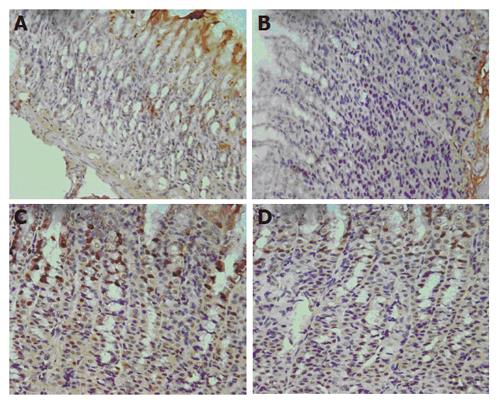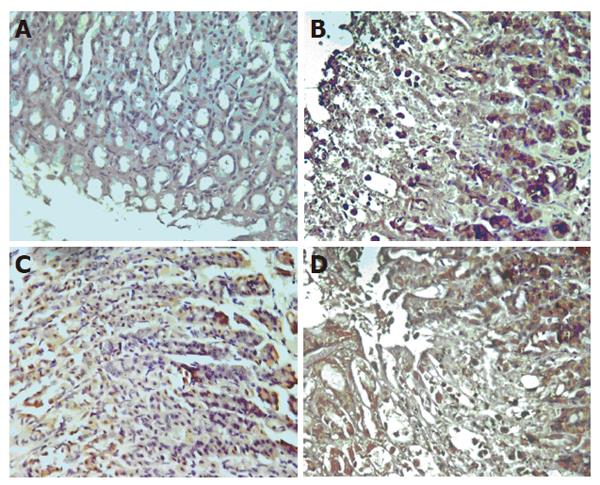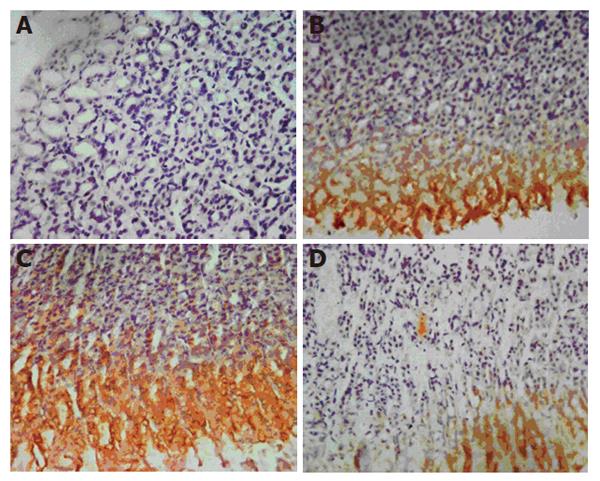INTRODUCTION
Acute gastric mucosal injury is often accompanied with decreased cell proliferation and increased cell apoptosis, while cell apoptosis decreases during the healing of gastric ulcers[1], thereby suggesting that inhibition of cell apoptosis is helpful for preventing stress ulcers. Studies show that heat shock protein 70 (HSP70) plays an important role in preventing stress-induced cell injury and promoting healing of injured cells[2]. So, it may be useful to induce expression of HSP70 in gastric mucosa to prevent stress-induced ulcers and promoting ulcer healing. Many studies have reported that acupuncture could induce the expression of HSP70. However, most of these studies were about cardiovascular and cerebrovascular diseases, and only a few about gastric disease.
Our previous studies have proved that acupuncture at “Zusanli” point could protect gastric mucosa against stress-induced injury[3,4], and acupuncture could inhibit gastric mucosal cell apoptosis in experimental gastric ulcer. Furthermore, a beneficial effect of moxibustion on gastric ulcers has been reported in the clinic. Our present study aimed to explore the effect of moxibustion on cell apoptosis and proliferation of injured gastric mucosa, and whether the effect was associated with regulation of HSP70.
MATERIALS AND METHODS
Materials
Moxa cones called Magic moxa 300 (type orientalI) were purchased from Suzhou Oriental Dry Moxa Factory. TGF-α radioimmunoassay reagent package (produced by radioimmunoassay office of Science and Technology Developing Center in Liberation Army Hospital), PCNA monoclonal antibody, HSP70 polyclonal antibody, apoptosis package (Wuhan Boster Biological Technology Co. Ltd), rabbit SP kit, mouse SP kit, brown DAB color-developing agent (Beijing Zhongshan Golden Bridge Biotechnology Co. Ltd), low temperature freezing centrifuge (TGL 16M), microscope (Motic B1), γ immunity calculating instrument (FJ-2008) were used. Other chemicals used were of analytical grade.
Animal experiment
Sixty healthy SD rats of either sex, weighing 200-250 g, were obtained from Animal Technology College of Hunan University of Agriculture. Rats were randomly divided into four groups, namely group A (with restraint), group B (with stress ulcer, SU), group C (with acupuncture at Zusanli and Liangmen point + SU), and group D (with acupuncture at non-acupoint + SU). Gastric ulcer model was established by fasting for 24 h and forced water (20°C) immersion (10 h). Moxibustion was applied to unilateral Zusanli and Liangmen points (selected on the basis of Experiment Acupuncture Science[5]) or non-acupoint (about 1 cm lateral to Zusanli and Liangmen points) for about 30 min (4 cones per point), once daily and continuously for 8 d. At the end of the experiments, gastric mucosal was sampled from 5 randomly selected rats in each group for detecting apoptosis index (AI), proliferating cell nuclear antigen (PCNA) activity, and HSP70 expression. Gastric mucosa from the remaining 10 rats in each group was sampled to examine gastric mucosal injury index (ulcer index, UI, GUTH method) and TGF-α content.
Determination of TGF-α
Samples of gastric mucosa were homogenized and treated with the test kit according to the manufacturer’s instructions.
Immunohistochemical analysis
Paraformaldehyde-fixed and paraffin-embedded tissues were cut into 4-μm thick sections, dewaxed in xylene and rehydrated through graded ethanol. Sections were treated with 30 mL/L H2O2 to inhibit endogenous peroxidase activity. Expression of PCNA and HSP70 was detected using SP immunohistochemical method (SP kit, Beijing Zhongshan Golden Bridge Biotechnology Co. Ltd. Mouse anti-rat monoclonal antibody at a dilution of 1:125 and rabbit anti-rat polyclonal antibody at a dilution of 1:125 were used for detection of PCNA and HSP70 expression, respectively. Cell apoptosis was examined using TUNEL method (Apoptosis Package, Wuhan Boster Biological Technology Co. Ltd). Sections were stained with brown DAB color-developing agent. Cells bearing a brown-yellow stain in the nuclei or cytoplasm were considered positive for HSP70. PCNA and cell apoptosis were considered when cells had a brown-yellow staining in the nuclei. Medical Image Analyzing System (MIAS) was used to calculate the percentage of positive cells.
Statistical analysis
All results were expressed as mean ± SD. Statistical significance of differences was performed by employing the ANOVA with SPSS software (Version 11.5). Differences were considered statistically significant when P was less than 0.05.
DISCUSSION
Much Chinese ancient literature documents that moxibustion can enhance the vital energy of the human body and its ability to prevent diseases. Modern studies proved that moxibustion could relieve pain, improve blood circulation, and regulate metabolism and immunity[6].
Our previous study demonstrated that acupuncture at different segments of Foot-Yangming Meridian had protective effects on injured gastric mucosal cells, and the effect of stimulation on the Zusanli point was the best[3]. Acupuncture at Zusanli point could reduce ulcer index in rats with gastric mucosal injury induced by infusing dehydrated alcohol into stomach[4].
Zusanli is often used to treat gastric disease[4]. Chen et al[7] found moxibustion could reduce gastric mucosal injury and accelerate ulcer healing in rats with gastric ulcer. The results of our study showed that moxibustion at Zusanli and Liangmen points could reduce UI of gastric mucosa, suggesting that moxibustion had protective effect on gastric mucosal cells.
Apoptosis is an active gene-controlled process of cell death and the primary form of programmed cell death[8,9]. Programmed cell death is a normal process in gastric mucosal cells and apoptosis is the chief death pattern in epithelial cells of the gastrointestinal tract[10] for destruction of unwanted and superfluous cells. Proliferation is as important as apoptosis for the development and homeostasis of metazoans. There is a balance between cell apoptosis and proliferation in normal gastric mucosa[11], while gastric mucosal diseases caused by stress injury are always accompanied with increased cell apoptosis. A few apoptotic cells exist in epithelial cells of normal gastric mucosa, but concentrated necrosis and apoptotic cells are found on the surface of ulcers[12]. Peng et al[13] found H pylori infection could induce apoptosis of gastric mucosal epithelial cells, but had no effect on cell proliferation. The proliferative cells could not balance out the apoptotic cells, which caused ulcers. The study on rats with stress ulcer demonstrated that stress induced, increased apoptosis of gastric mucosal epithelial cells and cell apoptosis was decreased during the healing of gastric ulcers[14]. Xiong et al[15] found that AI in ulcer model group was higher than that in normal group, while AI in treatment group decreased significantly after healing of ulcers. Many studies have reported that acupuncture could inhibit cell apoptosis in ischemic cardiac muscle and nervous system[16,17]. But there are less studies on the effect of acupuncture on cell apoptosis in the gastrointestinal tract mucosa. Acupuncture can inhibit apoptosis of colonic epithelial cells in ulcerative colitis[18]. Our previous study demonstrated that acupuncture at Zusanli point could induce the expression of Bcl-2 protein to inhibit and reduce gastric mucosal cell apoptosis induced by ethanol[19]. The results of the present study showed AI in group C was significantly lower than that in group B, indicating that acupuncture at Zusanli and Liangmen points could inhibit gastric mucosal cell apoptosis induced by water immersion and restraint stress. Proliferating cell nuclear antigen (PCNA) plays an important role during DNA synthesis and cell proliferation. Sun et al[20] found PCNA-LI was increased during healing of gastric mucosal injury. Our results showed that acupuncture at Zusanli and Liangmen points could promote cell proliferation to accelerate repair of the injured gastric mucosa.
TGF is a species of growth factor, which can promote cell proliferation and division as well as cell migration. Konturek et al[21] found TGF-α could accelerate the healing of stress injury induced by dehydrated alcohol and stress. The healing of gastric ulcers is accompanied with increased expression of TGF-α. TGF-α can promote cell proliferation, inhibit gastric secretion and improve blood flow around ulcer margin[22]. Furthermore, TGF-α can increase the content of DNA, RNA and protein in injured mucosa, accelerate tissue growth and repair[23]. The results of our study demonstrated that acupuncture at Zusanli and Liangmen points could increase the content of TGF-α in gastric mucosa accompanied with increased cell proliferation.
Heat shock proteins (HSPs), also called stress proteins, are a group of proteins that are present in all cells in all life forms. They are induced when a cell undergoes various types of environmental stresses like heat, cold and oxygen deprivation[24]. Over-expression of HSP70 has been found in gastric mucosa of rats with gastric ulcer and in patients with gastric carcinoma[25,26]. The over-expression of HSP70 can accelerate ulcer healing by increasing GMBF, promoting cell proliferation, inhibiting cell apoptosis, protecting cells against oxygen-free radical, accelerating protein synthesis[27-29]. Moxibustion, as a physiological stressor, can induce expression of HSP70[30,31]. The results of our study showed acupuncture at Zusanli and Liangmen points could increase the expression of HSP70 in gastric mucosa.
What is the relationship between HSP70 and the other protective factors Tsukimi et al[32] found the increased expression of HSP70 might be related to the synthesis and activity of growth factors, cytokine and COX-2. Increased expression of HSP70 in gastric mucosal stem cells induced by ethanol can promote proliferation of stem cells, thus to accelerate cell renovation of the gastric mucosa[33]. The results of our study suggested that acupuncture at Zusanli and Liangmen points could promote TGF-α synthesis, accelerate cell proliferation and inhibit cell apoptosis. And these effects are related to the expression of HSP70 induced by moxibustion.
COMMENTS
Background
Apoptosis is an active gene-controlled process of cell death and the chief death pattern in epithelial cells of gastrointestinal tract. There is a balance between cell apoptosis and proliferation in normal gastric mucosa, while gastric mucosal diseases caused by stress injury are always accompanied with increased cell apoptosis. It suggests that inhibition of cell apoptosis is helpful for preventing stress ulcer. Studies have reported that acupuncture could inhibit cell apoptosis in ischemic cardiac muscle and nervous system.
Research frontiers
Protective effect of acupuncture on gastric mucosa has been proved. And the mechanism has been explored in several levels including regulation of neuromechanism, effect of gut hormone, improvement of GMBF, effect of humoral factors, opposition on oxygen-free radical and enhancement of gastric wall barricade. Recent studies have shown acupuncture and moxibustion can induce HSP70 to protect gastric mucosa.
Innovations and breakthroughs
The study observed the protective effect of moxibustion on gastric mucosa. The previous study has proved acupuncture can inhibit gastric mucosal cell apoptosis induced by ethanol. This study explored the relationship between TGF-α, HSP70 and cell apoptosis.
Applications
The results of the present study proved pre-moxibustion could induce HSP70, increase TGF-α content and inhibit cell apoptosis to protect gastric mucosa against stress injury. Preventing gastric mucosal injury by pre-moxibustion could be widely promoted in the clinic.
Terminology
Heat shock proteins (HSPs) are a group of proteins that are present in all cells in all life forms. They are induced when a cell undergoes various types of environmental stresses like heat, cold and oxygen deprivation.
Peer review
In the present study, authors demonstrated that moxibustion at Zusanli and Liangmen points has a protective effect on rats gastric mucosa in stress-induced gastric ulcer via promoting TGF-α synthesis and proliferation of gastric mucosal cells, suppressing gastric mucosal cell apoptosis, and up-regulating HSP70 expression. This study is well designed and well conducted.















